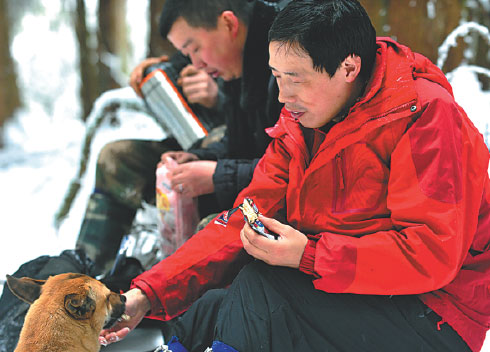Panda 'love corridor' under threat
 0 Comment(s)
0 Comment(s) Print
Print E-mail China Daily, April 14, 2015
E-mail China Daily, April 14, 2015
 |
|
Ranger Fu Qiang feeds a dog during a lunch break in a routine inspection in the Anzihe Nature Reserve. [Photo/China Daily] |
Off limits
Since 1998, workers at Anzihe have recorded more than 1,500 traces of panda activity, leading to estimates that the area is home to at least eight pandas, according to Wang Lei, deputy director of the reserve's management office.
A report released in February by the State Forestry Administration of China put the number of wild pandas at 1,864, with another 375 living in captivity.
Out of the nation's nature reserves, Anzihe has the highest panda population density, with a habitat stretching 99.42 square kilometers, roughly 98 percent of the park's total area.
In recent years, the reserve's infrared cameras have captured wild pandas more than 10 times, including the mother panda and her cub, and a panda marking a tree. Staff members have also rescued and treated two sick pandas.
Anzihe is the only viable route for wild pandas to travel between Wolong reserve, home to 143 pandas, and the Heishuihe reserve, which has 21. Other parts of the two reserves are blocked by rivers and cliffs.
Yet the spot is also popular with hikers, as it is only 70 km from downtown Chengdu, the provincial capital.
Wang, in the management office, said national nature reserves prohibit any human activity within core areas, while the outer areas are used as buffer zones and should be accessed only for the purposes of scientific research, which is tightly controlled by the forestry administrations.
Tourists are strictly banned from entering all areas, but they continue to sneak in, he said. The park rangers at Anzihe, of which there are only nine, find it almost impossible to stop them, whether they be in large groups or individuals, because of the large, unfenced area they need to cover.
Confrontations with tourists have led to attacks on staff members, Wang said, adding that there are no regulations or laws to punish hikers found on the reserve.
"People may think they are just visiting a park, but once they step foot on that prohibited land they are harming the wildlife," he said. "When the environment in Anzihe is affected, the breeding grounds and general habitat of the pandas and other endangered animals in the two adjoining reserves are influenced too."
Hou Rong, director of the Chengdu Research Base of Giant Panda Breeding, echoed his warning, adding that when humans invade, wild animals are scared away.
Her center has helped to breed many pandas as well as trained them for survival in the wild, but she said pandas can potentially migrate great distances after they are released.
"We've traced our pandas kilometers away from where we released them," she said. "It's very likely they will notice a lot of human activity and will feel unsafe. For wild animals, long-distance migration holds a high risk of death."





